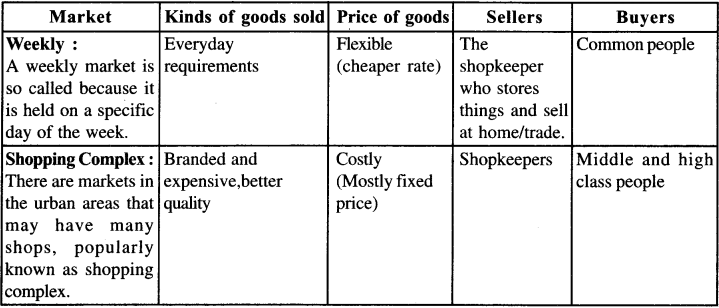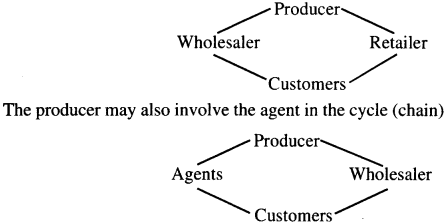Markets Around Us Class 7 Questions and Answers Civics Chapter 8
Class 7 Civics Chapter 8 NCERT Textbook Questions and Answers
Question 1.
Why do people go to a weekly market? Give three reasons.
Answer:
People go to a weekly market because of the following reasons:
- Many things in weekly markets are available at cheaper rates.
- Most things that we need are available at one place.
- Since weekly markets have a large number of shops selling the same goods, then, things can be available at a cheaper rate.
Question 2.
Who are the sellers in a weekly market? Why don’t we find big business persons in these markets?
Answer:
The sellers in a weekly market are local people who do not have permanent shops. These small traders set up shops for the day and then close them in the evening. Then they may set up at a different place the next day.
We do not find big businessmen in these markets, because they have permanent shops in a shopping complex or mall.
Question 3.
Why are things cheap in the weekly market?
Answer:
Things are cheap in the weekly market because of the following reasons :
- The shops are temporary, i.e., not permanent. The shopkeepers do not have to pay rent, electricity, fees to the government, etc.
- The shopkeepers do not have to pay wages to their workers.
- Most of the things that are sold by the shopkeepers are stored at home.
- Most of them are helped by, their family members and, hence do not need to hire workers.
Question 4.
Explain with an example how people bargain in the market. Can you think of a situation where the bargain would be unfair?
Answer:
Weekly markets have a large number of shops selling the same goods which means there is a competition among them. If some trader were to charge a high price, for example, apples, people would move to another shop where the apples may be available more cheaply or the buyer may bargain and bring the price down.
The bargain would be unfair if the seller is selling his goods at a reasonable (cheaper) price.
Question 5.
Why did Sujata carry a notebook? Do you think this system is useful? Can there be problems?
Answer:
Sujata carried a notebook because she was buying goods on credit. It is useful as long as both buyer and seller and fair. The buyer should pay the seller the amount of the exact time without any hindrance.
Yes, this system can create problems when the buyer does not pay his dues; or the seller has forgotten to write any article sold to the buyer, etc.
Question 6.
What are the different kinds of shops that you find in your neighbourhood? What do you purchase from them?
Answer:
We find all types of shops in our neighbourhood, such as groceries, clothes, chemists, daily needs shop, fair price, vegetable and fruit shops, etc.
Normally, we purchase all the items needed from them.
Question 7.
Why are goods sold in permanent shops costlier than those sold in the weekly markets or by road side hawkers?
Answer:
Goods sold in permanent shops are costlier because these shops, incur a lot of expenditure” they have to pay rent, electricity, fees to the government, and, they also have to pay wages to their workers. More over these shops sell branched or packed goods.
Question 8.
Why do you think the guard wanted to stop Kavita and Sujata from entering the shop? What would you say if someone stops you from entering a shop in a market?
Answer:
Kavita and Sujata were wandering on the 3rd floor. The guard wanted to stop them for entering the shop because he thought that they did not have the money to buy clothes. There were just going inside to look at the clothes being sold at the shop.
If someone stops me from entering a shop in a market, I would pull his hat and remind him that everyone is free to go to any place he/she likes. It is not necessary that in whichever shop we enter, we have to buy something.
Question 9.
Why do people not bargain in shops located in malls whereas they bargain in weekly markets?
Answer:
People do not bargain in the shop located in the malls whereas they bargain in weekly market because branded goods available in the mall are expensive, durable, and often promoted by advertising, claiming of better quality as compared to non branded goods. Fewer people afford to buy but dono’t bargain in terms of quality and brand.
Question 10.
How do you think your neighbourhood shop gets its goods? Find out and explain with some examples.
Answer:
Our neighbourhood shop gets its goods through agents or wholesaler For example A vegetable wholesale trader will not buy a few kilos of vegetables, but will buy a large lot of 25 to 100 kilos.
There will be then sold to other traders. It is through this the retailer get the goods and finally reaches to our neighbourhood shop.
Question 11.
Why is a wholesale trader necessary?
Answer:
Goods are produced in factories, on farms, and in homes. However, we don’t buy directly from the factory or from the farm. The goods from factories, or farms etc. are purchased by the wholesaler and sold to the retailer.
From the retailer we buy goods. Thus, a wholesale trader is necessary.
Question 12.
In what ways is a hawker different from shop-owner?
Answer:
Hawker is a person who sells his product or goods by moving on the streets while a shop-owner is a person who sells his goods at a fixed place. A hawker can sell different goods like vegetables, clothes, shoes, etc., while shop owner sell the some things or goods. For e.g. in a book shop you can get only books, stationery etc., not vegetables, ice-cream, sweets etc.
Question 13.
Compare and Contrast weekly market and a shopping complex on the following :

Answer:

Question 14.
Explain how a chain of markets is formed. What purpose does it serve?
Answer:
A series of markets that are connected like a link in a chain because products pass from one market to another is known as chain of market. The people in between the producer and the final consumers are the traders, middlemen agent, etc.
(a) The producer supplies goods to retailer who sell them to customers. Producer : Retailer : Customers producer: Wholesaler: Customer. The goods can be sold with the help of retailer and wholesaler in the following chain process :

It is through this links (chain) of the trader the goods reaches far away places. The purpose of this chain markets is to make the easiest availability of all the goods at far away place immediately.
Question 15.
All persons have equal right to visit any shop in a market place. Do you think this is true of shops with expensive products? Explain with example.
Answer:
Yes, all persons have equal rights to visit any shop in a market place. It is also true of shops with expensive products.
Example:
Kavita and Sujata are two friends. They went to Anzal Mall, a five floor shopping complex. They were enjoying themselves, then they decided to go to a branded ready made shop which was situated on 3rd floor. Security guard wanted to stop them, but he could not, they looked at some costly dresses, but none was less than 2500 Rs. Sujata whispered to Kavita, let us try on another shop. I’ll take you another shop which has good quality readymade clothes at very reasonable prices.
Question 16.
‘Buying and selling can take place without going to a market place’. Explain this with the help of examples.
Answer:
Yes, Buying and selling can take place without going to a market place. We can place order for variety of things through phone and these days through internet, and the goods are delivered at our homes.
Example :
In clinic and nursing homes we have noticed that sales representatives waiting for doctors. Such persons are also engaged in selling of goods. Thus buying and selling take . place in different ways, not necessarily through shops in the market.
Another example can be given of a Pizza Hut. The favourite Pizzahuts have toll free mobile and land-line numbers. We can place our order through phone call. Their home delivery service will drop the pizza at our doorstep within a short time. These shops run 24 hrs daily.